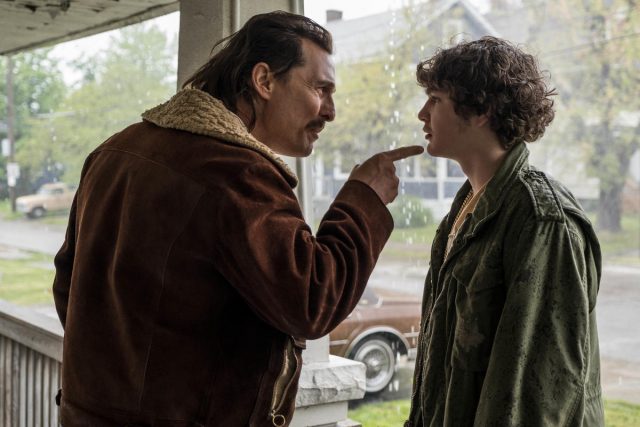White Boy Rick: Skin Deep, by Rita Cannon
White Boy Rick tells the true story of Richard Wershe Jr., a Detroit teenager who at fourteen became the youngest FBI informant ever and by seventeen was sentenced to life in prison for doing what the FBI had literally taught him how to do — sell cocaine. Wershe’s story was largely unknown to the public until The Atavist published an article about him in 2014, by which time Wershe had already been imprisoned for 26 years. Yann Demange’s film treatment of this infuriating incident is surprisingly rollicking and funny for much of its runtime but when the dramatic hammer comes down, it really comes down.
Played by first-time actor Richie Merritt, Rick is growing up in a rough area of Detroit in the 80s with his father Rick Sr. (Matthew McConaughey), a quasi-legal firearms dealer with connections to the drug trade and dreams of going straight by opening a video store. Rick is good friends with some of the young drug dealers his dad sells to but stays out of the business himself, at least until a couple of FBI agents approach Rick Sr. looking for information on his clientele. When Rick Sr. demurs, they shift their focus to his son, eventually offering more money than a lower-class teenage boy can resist, and securing him as an informant against his pals.
Rick spends most of the movie as a fairly passive character. Whether it’s his dad, his friends, or the FBI, he’s constantly being compelled to do things by people older and more powerful than he and puts up a minimal amount of resistance before going along. Merritt’s performance for this stretch of the film is undeniably effective; even when toting a gun, he has a sweet, puppyish quality that never lets you forget just how young and vulnerable he actually is. As the assignments given to him by the feds get more and more dangerous, he adopts the swagger of a criminal kingpin, but he always comes off a like a kid playing dress-up, half thrilled by the debauchery he gets to engage in and half scared of it. It’s not until fairly late in the game that Rick starts making some active attempts to gain back control of his life, but when he does, Merritt never totally sheds that feckless quality, and it feels like a limitation of his acting ability rather than a conscious choice.
Matthew McConaughey fares much better as Rick Sr. Flattening his signature drawl into a mostly convincing Midwestern accent seems to have helped rein in his more bombastic tendencies. It’s still an undeniably big performance; after all, he’s playing a guy who thinks the best way to wrangle his unruly family back into the house is by brandishing a rifle at them. But it also feels focused and grounded in real emotion, and it’s easy to imagine a more overwrought version of this character that would have gotten tiresome quickly.
White Boy Rick follows a trajectory we’ve seen in plenty of other rise-and-fall period dramas, from Goodfellas to The Wolf of Wall Street to Boogie Nights: The glittering blur of fabulous period costumes, tough guy posturing, and galvanizing musical montages (by the way, music supervisor Dan Rodgers deserves a shout-out for his electrifying old-school hip hop soundtrack) eventually give way to severe consequences. The difference between Richard Wershe Jr. and a figure like Henry Hill or Jordan Belfort is that most viewers will feel strongly that Rick doesn’t really deserve the draconian punishment he’s eventually given. Rick is reckless and short-sighted, but he never displays anything close to cruelty. Considering the dire financial straits he and his family are left in after the FBI has no further use for him, even calling him greedy seems like a stretch.
The biggest weakness of White Boy Rick is that it fails to fully engage with the complexity of what happens to him. The agents who hang Rick out to dry are played by Jennifer Jason Leigh, Rory Cochrane, and Brian Tyree Henry, but it struck me as a waste to cast such great actors as characters that aren’t granted any nuance or inner conflict — they just move the plot forward. How do these people justify to themselves that they ruined a young man’s life? Especially considering that such callous treatment of informants by the FBI and other law enforcement agencies is far from unusual (check out Sarah Stillman’s 2012 New Yorker article “Throwaway Informants” if you really want your day ruined), not examining their behavior any further feels like a missed opportunity. While undeniably entertaining, White Boy Rick ultimately hobbles itself by forcing a complicated story into a simpler format than it deserves.





























